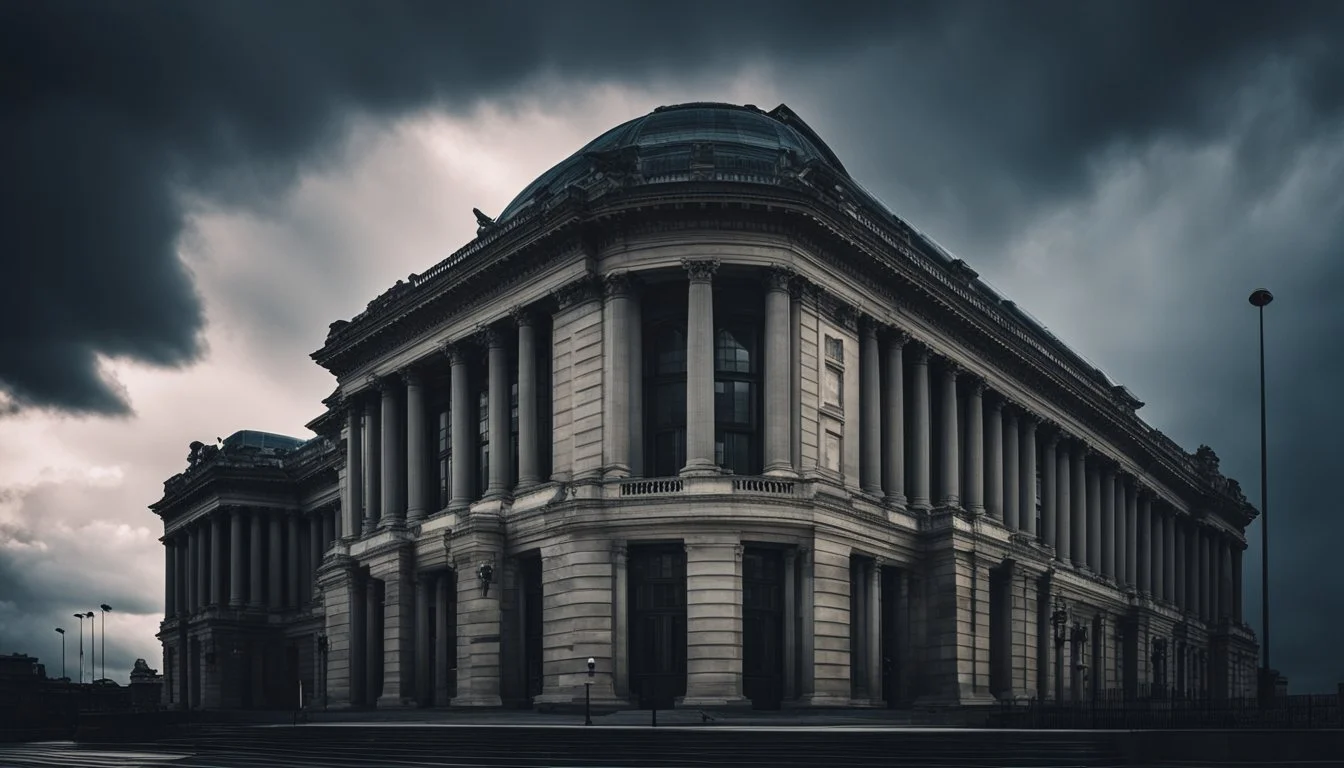6 True Crime Documentaries About Corruption in Local Governments
Exposing Hidden Scandals
True crime documentaries have long captivated audiences with their raw and unfiltered portrayal of real-life events. These films uncover the hidden and often shocking truths behind criminal activities, and a subgenre that has garnered significant attention is those focused on corruption within local governments.
Exploring these documentaries reveals the extent to which unethical practices can infiltrate systems meant to serve the public. Through methodical investigation and compelling storytelling, they shed light on the corrupt deeds of public officials and the impact these actions have on communities. These films serve as a reminder of the importance of transparency and accountability in governance.
1) 'The Innocent Man' by John Grisham (2018)
'The Innocent Man' by John Grisham is a true crime documentary series that explores the wrongful convictions of Ron Williamson and Dennis Fritz in Ada, Oklahoma.
Based on Grisham's 2006 nonfiction book, the series examines the flawed investigation and prosecution that led to their wrongful imprisonment for the murder of Debra Sue Carter.
The documentary highlights issues such as coerced confessions, unreliable witnesses, and the role of local government corruption.
Through interviews, archival footage, and investigative journalism, 'The Innocent Man' presents a gripping narrative on miscarriages of justice and institutional failures.
It sheds light on the systemic issues within smaller jurisdictions where power dynamics can profoundly affect fair trial outcomes.
For more information, visit IMDb.
2) 'The Seven Five' directed by Tiller Russell (2014)
'The Seven Five' takes a deep look into the notorious corruption within the New York Police Department in the 1980s. This documentary focuses on the activities of Michael Dowd, perhaps the dirtiest cop in New York City's history.
Dowd, alongside his fellow corrupt officers, engaged in numerous illegal activities, including stealing money and dealing drugs, while ostensibly upholding the law in Brooklyn's 75th precinct. The film intricately covers Dowd's double life and the extent of his corruption.
Viewers get a firsthand look through interviews with Dowd and his associates. The documentary delves into the impact of their actions on the community and the police department. It's a riveting portrayal of unchecked power and the consequences of moral compromise.
For those interested in true crime and police corruption, this film offers a compelling narrative filled with real-life drama and ethical questions.
More information about 'The Seven Five'
3) 'The Jinx: The Life and Deaths of Robert Durst' by Andrew Jarecki (2015)
'The Jinx: The Life and Deaths of Robert Durst' is a true crime documentary series that delves into the life of Robert Durst, a wealthy New York real estate heir who became a key suspect in several unsolved homicides. The series was directed by Andrew Jarecki, who also directed 'All Good Things,' a fictional film inspired by Durst's story.
The first season, which premiered on HBO in 2015, consists of six episodes. It explores the mysterious deaths of Kathleen McCormack, Susan Berman, and Morris Black, all linked to Durst. The series combines interviews, reenactments, and real footage to present a detailed narrative of these cases.
An unexpected and chilling moment is Durst's off-camera confession, caught by a live microphone. This revelation added a dramatic twist to the documentary, capturing widespread attention and contributing to Durst's eventual arrest and trial.
The series' success is attributed to its in-depth investigation and storytelling, which kept viewers engaged and sparked public and legal interest in Durst's actions. 'The Jinx' plays a crucial role in the true crime documentary genre, highlighting the intersection of wealth, power, and crime.
For more information, visit Wikipedia.
4) 'Wild Wild Country' by Chapman and Maclain Way (2018)
"Wild Wild Country" is a six-part Netflix documentary series directed by Chapman and Maclain Way. The series delves into the controversy surrounding Rajneeshpuram, a religious community established in Wasco County, Oregon, in the early 1980s.
The documentary examines the arrival of the Rajneeshees, led by spiritual leader Bhagwan Shree Rajneesh, and their conflict with the local residents of Antelope.
The Rajneeshees transformed the town into a bustling commune, creating tension with the locals. The series meticulously documents the ensuing legal battles, allegations of bioterrorism, and political corruption.
This documentary sheds light on the complexities and consequences of a small town caught in a clash between differing ideologies and the reach of local government. The film's detailed exploration provides viewers with a comprehensive view of the events and their impact on the community.
For more information on "Wild Wild Country," check the Wikipedia page.
5) 'The Keepers' directed by Ryan White (2017)
'The Keepers' is a seven-episode documentary series focusing on the unsolved murder of Sister Catherine "Cathy" Cesnik. She was a nun and high school teacher in Baltimore who disappeared in 1969. Her body was discovered months later, but her murder remains unsolved.
Directed by Ryan White, the series dives deep into allegations of sexual abuse at Archbishop Keough High School. Former students accuse Father A. Joseph Maskell, a priest at the school, of abusing them. They believe Cesnik was killed because she knew about the abuse and intended to expose it.
The series provides a platform for the survivors to share their stories, removing the silence that surrounded their traumatic experiences. Ryan White's directorial approach ensures their voices are centered and heard.
'The Keepers' blends investigative journalism with deeply personal narratives. It recounts the struggles of those fighting for justice and highlights the suspected cover-ups by local authorities and the church.
For more information on 'The Keepers,' please visit Wikipedia.
6) 'Strong Island' by Yance Ford (2017)
"Strong Island" by Yance Ford is a powerful true-crime documentary that examines the 1992 murder of Ford's brother, William Ford Jr., in Central Islip, New York.
William Ford Jr., a young African-American teacher, was shot and killed by Mark P. Reilly, a 19-year-old white auto repair shop employee. The film delves deep into the Ford family's quest for justice.
The documentary sheds light on racial tensions and the failure of the local justice system. The Suffolk County Police Department filed the case as a homicide, yet the actions of the police suggested a different narrative.
Yance Ford documents his personal journey with a poignant lens, highlighting the emotional and societal impacts of his brother's death. The Ford family believed that local police treated the perpetrator leniently, adding another layer of injustice.
In "Strong Island," viewers can witness a family's heartbreak and resilience in the face of a flawed system. It serves as a stark reminder of the racial inequalities that plague American society.
For more information on "Strong Island," visit IMDb.
Understanding Corruption in Local Governments
Corruption in local governments manifests in various forms, from bribery to nepotism. Historically, it has deep roots, often tied to political and economic developments.
Definition and Types of Corruption
Corruption in local governments involves the misuse of public office for private gain. It includes activities like bribery, where officials receive money or gifts for political favors. Nepotism is another form, where officials favor relatives or friends for jobs or contracts.
Embezzlement occurs when officials steal public funds, while fraud involves deception for financial gain. These actions undermine trust and effective governance, impacting public services and community welfare.
Historical Context
Historically, corruption in local governments has ebbed and flowed, influenced by political and economic conditions. During the Gilded Age in the United States, corruption was rampant in urban politics, exemplified by figures like Boss Tweed in New York City.
Economic downturns often increase corruption as officials exploit instability for personal gain. Reforms and anti-corruption movements have periodically emerged to counteract these practices. Awareness and historical examples highlight the persistent nature of this issue and its significant consequences.
Impact of Corruption on Communities
Corruption in local governments affects communities deeply, leading to economic hardships and a decline in social trust. These twin impacts often result in long-term damage that can be difficult to reverse.
Economic Consequences
Economic ramifications of local government corruption can be severe. Misappropriation of funds, bribery, and embezzlement divert resources from critical public services. Education, healthcare, and infrastructure frequently suffer, causing tangible declines in community well-being.
In addition, corruption can deter business investments. Companies are less likely to invest in regions where they must navigate corrupt practices, leading to reduced job opportunities and stagnating local economies. This loss of economic activity has a direct impact on the standard of living for community residents.
Furthermore, taxpayers often bear the financial burden of corruption. They pay higher taxes or fees to cover the shortfall created by illicit activities. This exacerbates economic disparity, often hitting the most vulnerable populations hardest.
Social Trust Erosion
Corruption erodes social trust, a critical component of a functioning community. When citizens perceive that leaders are corrupt, their confidence in public institutions declines. This leads to lower civic engagement and participation in community initiatives.
In regions where corruption is rampant, people may become disillusioned with the political process. They may believe that their votes or voices do not matter, which can undermine democratic principles. This erosion of trust can also increase social tensions, as people become more suspicious of one another.
The lack of trust extends to law enforcement and judicial systems. If these systems are perceived as corrupt, people are less likely to seek justice or cooperate with authorities. This can lead to higher crime rates and a general sense of insecurity within the community.
Legal and Ethical Issues
Legal frameworks and historical case studies provide a comprehensive look at how corruption in local governments is addressed. These elements ensure that those in power are held accountable and that justice is served.
Laws Against Corruption
Laws play a critical role in preventing and addressing corruption. Many countries have implemented robust legal frameworks to combat misconduct by public officials.
Key examples include anti-bribery laws, which prohibit officials from accepting gifts or favors in exchange for preferential treatment. The Foreign Corrupt Practices Act (FCPA) in the United States and similar laws globally target both domestic and international bribery.
Transparency regulations require government processes to be open and accessible, thus reducing the opportunities for clandestine deals. Whistleblower protections shield those who report corruption, ensuring they are not subject to retaliation. These laws collectively form a barrier against corrupt activities, maintaining the ethical integrity of public offices.
Case Studies and Precedents
Examining case studies provides valuable insights into how legal systems handle corruption. Notable instances, like the Panama Papers, exposed widespread tax evasion and corruption through leaked financial documents.
Another significant case is the Ferguson Police Department investigation, which revealed systemic abuses and misconduct. These case studies demonstrate the effectiveness of legal actions and the importance of journalistic investigations in uncovering corruption.
Precedents such as the conviction of former officials serve as a deterrent, signaling to others that corrupt actions will result in severe consequences. The combination of case studies and legal precedents highlights the importance of vigilance and accountability in maintaining ethical governance.







